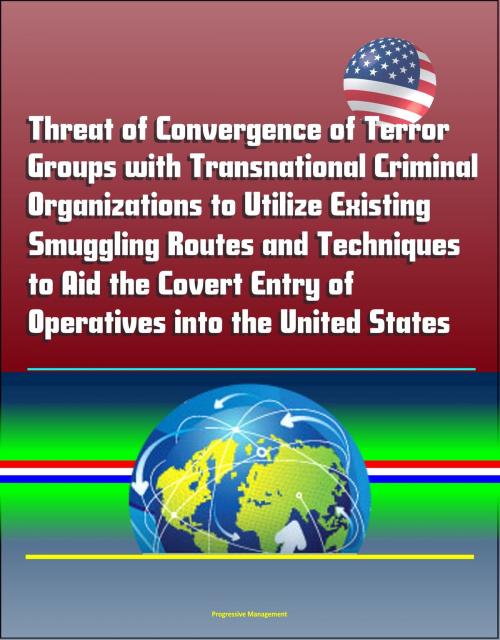Threat of Convergence of Terror Groups with Transnational Criminal Organizations to Utilize Existing Smuggling Routes and Techniques to Aid the Covert Entry of Operatives into the United States
Nonfiction, History, Military, United States, Social & Cultural Studies, True Crime| Author: | Progressive Management | ISBN: | 9781370429851 |
| Publisher: | Progressive Management | Publication: | March 17, 2017 |
| Imprint: | Smashwords Edition | Language: | English |
| Author: | Progressive Management |
| ISBN: | 9781370429851 |
| Publisher: | Progressive Management |
| Publication: | March 17, 2017 |
| Imprint: | Smashwords Edition |
| Language: | English |
This report has been professionally converted for accurate flowing-text e-book format reproduction. Transnational criminal organizations (TCOs) have profited from the smuggling of contraband into the United States since its existence. Terror groups have explicitly stated their intent to target the citizens, infrastructure, and economy of the United States. This thesis examined the major TCOs operating across the borders of the United States and the capabilities they possess and utilize. This thesis also examined terror groups that have proclaimed a desire to attack the homeland. As a methodology to analyze the likelihood of terror groups converging with TCOs to exploit existing smuggling infrastructure to enter operatives into the United States, a purposive survey was delivered to a group of subject matter experts in the areas of counter-terrorism, border security, and disruption of TCOs. The majority of these subject matter experts agreed that terror groups will converge with TCOs to enter the United States.
CHAPTER 1 - INTRODUCTION * Introduction * Primary Question * Secondary Questions * Background * Assumptions * Definitions * Delimitations * CHAPTER 2 - LITERATURE REVIEW * TCOs * Capabilities of TCOs * Terror Groups Attacks * Inspiration * Convergence * Conclusion * CHAPTER 3 * RESEARCH METHODOLOGY * Survey Method * Delphi Method * Participants * Confidentiality * Surveys * CHAPTER 4 * ANALYSIS * Participants * Operational Environment * Summary * CHAPTER 5 * CONCLUSIONS AND RECOMMENDATIONS * Introduction * Interpretation of Findings * Mitigation * Recommendations *Summary and Conclusions
The United States has recognized the need to secure its borders since its inception. The formal history of border security in the United States can be traced to the origins of the U.S. Customs Service on September 2, 1789. Initially, the responsibilities of the U.S. Customs Service were primarily the collection of tariffs and duties as prescribed by law (U.S. Customs and Border Protection 2014a). In 1891, the United States formalized the recognized need to administer immigration inspections as well of traditional customs inspections. The 1891 Immigration Act was the impetus for the formation of the Office of the Superintendent of Immigration in the Treasury Department. This agency was charged with permitting or denying entry of immigrants into the U.S. based on their admissibility. This agency would eventually become the United States Immigration and Naturalization Service (INS). Both the INS and the U.S. Customs Service were primarily focused on traffic and enforcement at the official U.S. ports of entry. In 1924, the U.S. Border Patrol (USBP) was created as a solution to address the cross border criminal activity occurring between the official ports of entry into the United States In 1925, the purview of the USBP expanded to include the coasts of the United States as well as the contiguous borders with Mexico and Canada.
This report has been professionally converted for accurate flowing-text e-book format reproduction. Transnational criminal organizations (TCOs) have profited from the smuggling of contraband into the United States since its existence. Terror groups have explicitly stated their intent to target the citizens, infrastructure, and economy of the United States. This thesis examined the major TCOs operating across the borders of the United States and the capabilities they possess and utilize. This thesis also examined terror groups that have proclaimed a desire to attack the homeland. As a methodology to analyze the likelihood of terror groups converging with TCOs to exploit existing smuggling infrastructure to enter operatives into the United States, a purposive survey was delivered to a group of subject matter experts in the areas of counter-terrorism, border security, and disruption of TCOs. The majority of these subject matter experts agreed that terror groups will converge with TCOs to enter the United States.
CHAPTER 1 - INTRODUCTION * Introduction * Primary Question * Secondary Questions * Background * Assumptions * Definitions * Delimitations * CHAPTER 2 - LITERATURE REVIEW * TCOs * Capabilities of TCOs * Terror Groups Attacks * Inspiration * Convergence * Conclusion * CHAPTER 3 * RESEARCH METHODOLOGY * Survey Method * Delphi Method * Participants * Confidentiality * Surveys * CHAPTER 4 * ANALYSIS * Participants * Operational Environment * Summary * CHAPTER 5 * CONCLUSIONS AND RECOMMENDATIONS * Introduction * Interpretation of Findings * Mitigation * Recommendations *Summary and Conclusions
The United States has recognized the need to secure its borders since its inception. The formal history of border security in the United States can be traced to the origins of the U.S. Customs Service on September 2, 1789. Initially, the responsibilities of the U.S. Customs Service were primarily the collection of tariffs and duties as prescribed by law (U.S. Customs and Border Protection 2014a). In 1891, the United States formalized the recognized need to administer immigration inspections as well of traditional customs inspections. The 1891 Immigration Act was the impetus for the formation of the Office of the Superintendent of Immigration in the Treasury Department. This agency was charged with permitting or denying entry of immigrants into the U.S. based on their admissibility. This agency would eventually become the United States Immigration and Naturalization Service (INS). Both the INS and the U.S. Customs Service were primarily focused on traffic and enforcement at the official U.S. ports of entry. In 1924, the U.S. Border Patrol (USBP) was created as a solution to address the cross border criminal activity occurring between the official ports of entry into the United States In 1925, the purview of the USBP expanded to include the coasts of the United States as well as the contiguous borders with Mexico and Canada.















